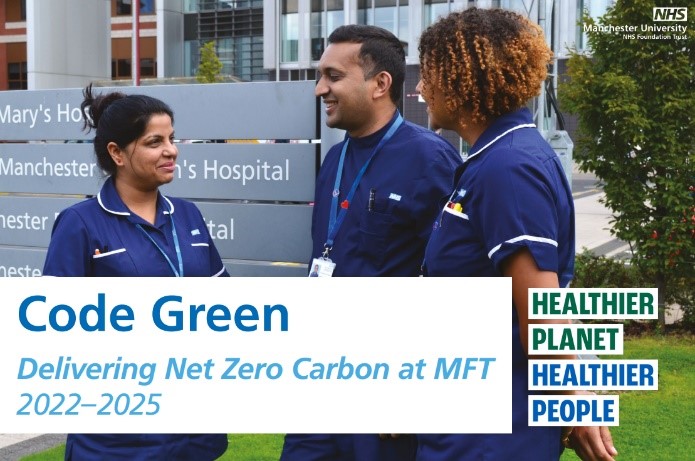
News from a sustainable NHS on our doorstep: Manchester University NHS Foundation Trust (MFT)
Blog by Sarah Hewett – Sustainability Officer – Email: Sarah.Hewett@mft.nhs.uk
Twitter (X): @MFTgreen
Greener NHS Context
In October 2020, the NHS became the world’s first health service to commit to reaching carbon net zero, in response to the profound and growing threat to health posed by climate change. With around 4% of the country’s carbon emissions, and over 7% of the economy, the NHS has an essential role to play in meeting the net zero targets. The NHS carbon footprint is split into two key parts, the emissions the NHS has direct control over and the emissions the NHS has influence over. For the emissions under direct control, the target is net zero by 2040, and then emissions under our influence – net zero by 2045.
MFT Green Plan
Manchester University NHS Foundation Trust (MFT) is the main provider of hospital care to approximately 750,000 people in Manchester and Trafford and the single biggest provider of specialised services in the North West of England.
MFT has a net zero target for emissions within direct control slightly earlier than NHS England of 2038 in line with the Greater Manchester Combined Authority (GMCA) and the UoM target. This target is based on the carbon budget calculated by the Tyndall Centre, UoM to avoid catastrophic climate change. This carbon budget recommends carbon reductions of at least 10% per year until zero Carbon in 2038.
The MFT footprint is split into Carbon Footprint (within our direct control – biggest proportion is energy) and Carbon Footprint Plus (within our influence – biggest proportion is supply chain). Within the MFT Green Plan there are ten areas of focus which were identified as key hotspots where reductions in emissions can be made:
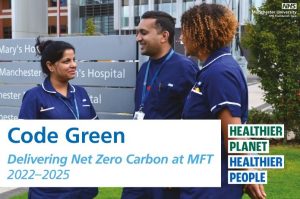 Sustainable Models of Care
Sustainable Models of Care- Digital Transformation
- Supply Chain and Procurement
- Medicines
- Food and Nutrition
- Estates and Facilities
- Travel and Transport
- Climate Change Adaptation
- Green Spaces and Biodiversity
- Workforce, Networks and System Leadership
NFT Case Study Examples
Walking Aid Recycling
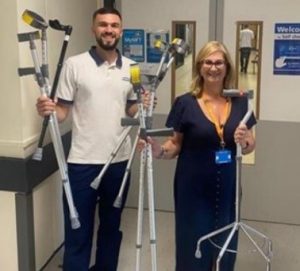 Previously, there was no option for patients to return walking aids that they no longer needed. If just two out of five walking aids were returned, the average hospital could save up to £46k per year. Reusing a refurbished walking aid is on average 98% lower in carbon emissions than using a new walking aid. Increasing the return rate over the next three years could reduce NHS carbon emissions by 7,400 tCO2e, equivalent to 4,565 return flights from Manchester to New York.
Previously, there was no option for patients to return walking aids that they no longer needed. If just two out of five walking aids were returned, the average hospital could save up to £46k per year. Reusing a refurbished walking aid is on average 98% lower in carbon emissions than using a new walking aid. Increasing the return rate over the next three years could reduce NHS carbon emissions by 7,400 tCO2e, equivalent to 4,565 return flights from Manchester to New York.
Staff developed a scheme where patients are prompted to return devices at the point of allocation. QR codes linked to a postcode locator tool have also been attached to devices, allowing patients to scan their walking aid to find the nearest MFT drop-off location. These efforts have led to a return rate of 18% in the first trial period, with carbon savings of 15 tCO2e.
Sustainable Inhaler e-learning
Inhalers are responsible for over 700 tCO2e each year, with one Ventolin inhaler producing the same carbon emissions as driving 175 miles, and emergency inhalers (metered dose inhalers) are up to 25 times more carbon intensive than preventor inhalers (dry powdered inhaler). Regular use of preventor inhalers, rather than emergency inhalers, is better for patient health, therefore assessing patient inhaler technique is crucial to manage respiratory conditions effectively as well as reducing carbon.
A staff survey demonstrated that only 47% of medical staff check a patient’s inhaler technique despite 75% agreeing this is important for patients. The Pharmacy team secured £10,000 through Greener NHS funding (Healthier Futures Action Fund) in 2022 to develop an e-learning package on the environmental impacts of inhalers and how to assess inhaler technique to optimize therapy. The module was created in house by MFT Medical Illustration and is available to all staff through the MFT learning hub.
Student project – The Wombles Project
 Correct segregation of clinical waste is important to not only costs but carbon. Infectious waste is placed in orange bags to be incinerated, which is carbon intensive and costly. Clinical waste that is not infectious gets treated and turned into energy, which is cheaper and better for the environment.
Correct segregation of clinical waste is important to not only costs but carbon. Infectious waste is placed in orange bags to be incinerated, which is carbon intensive and costly. Clinical waste that is not infectious gets treated and turned into energy, which is cheaper and better for the environment.
A 5th year medical student at Wythenshawe Hospital was concerned non-infectious waste was being placed in orange bags. She decided to take 53 orange bags (103kg) weigh them and properly segregate out the waste in these bags. She found that only 4% of the waste in these bags actually needed to be incinerated, which equated to 2 out of 53 bags. She used this information to help educate staff on the importance of correct waste segregation for cost saving but also for the environment.
Resources
- Sustainable MFT Webinar Playlist – email timetoact@mft.nhs.uk to be added to the mailing list for the monthly webinars.
MFT’s Ask
The NHS & Healthcare services are part of the problem of climate change, but they also have the power to be part of the solution. We would love for future staff within healthcare and the sciences to have a role in this solution. Our ask to students and the Faculty would be to think of embedding environmental sustainability into the curriculum, placement project ideas and plans. Hopefully the case studies above have helped with inspiration but please reach out to the team for more ideas: timetoact@mft.nh.uk.
Use the resources above to educate yourself and others around you about the climate crisis and the impact it will have on health. The worst thing we can do for climate change is to not talk about climate change, so have those conversations!
See the below for key sustainability achievements in 2022/23 at MFT, more can be found in our annual report.
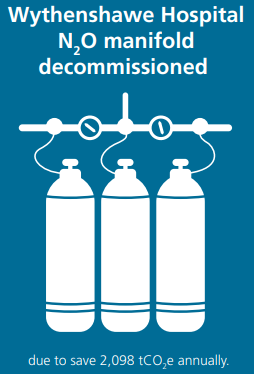

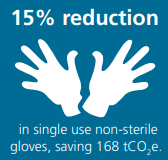

0 Comments